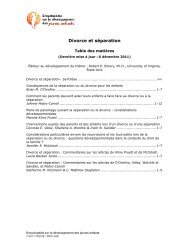Cognition sociale - Encyclopédie sur le développement des jeunes ...
Cognition sociale - Encyclopédie sur le développement des jeunes ...
Cognition sociale - Encyclopédie sur le développement des jeunes ...
Create successful ePaper yourself
Turn your PDF publications into a flip-book with our unique Google optimized e-Paper software.
COGNITION SOCIALE<br />
Les décideurs politiques : Les politiques familia<strong>le</strong>s qui encouragent <strong>des</strong> relations parentnourrisson<br />
étroites et soutenantes (p.ex., <strong>des</strong> congés de maternité/paternité généreux, de<br />
l’assistance pour <strong>le</strong>s parents qui subissent une dépression postnata<strong>le</strong>) sont importantes,<br />
mais doivent être complétées par <strong>des</strong> interventions pendant la phase de trottinage<br />
jusqu’aux années préscolaires. Les initiatives éducatives qui encouragent l’apprentissage<br />
émotionnel et social sont prometteuses, mais doivent s’étendre au-delà <strong>des</strong> facteurs<br />
relatifs à l’enfant afin de prendre en compte <strong>le</strong>s environnements sociaux <strong>des</strong> enfants<br />
(p.ex., la popularité auprès <strong>des</strong> pairs et la victimisation <strong>des</strong> pairs). Fina<strong>le</strong>ment, <strong>des</strong><br />
politiques sont nécessaires en vue de mieux sensibiliser <strong>le</strong>s cliniciens au fait que <strong>le</strong>s<br />
enfants qui ont <strong>des</strong> difficultés langagières spécifiques ou <strong>des</strong> problèmes de conduite (ainsi<br />
que <strong>le</strong>s enfants atteints d’un troub<strong>le</strong> du spectre autistique) manifestent souvent <strong>des</strong><br />
difficultés en matière de cognition <strong>socia<strong>le</strong></strong>.<br />
RÉFÉRENCES<br />
1. Baron-Cohen S. Mindblindness. London, UK: MIT Press; 1995.<br />
2. Farrant B, F<strong>le</strong>tcher J, Maybery M. Specific language impairment, theory of mind,<br />
and visual perspective taking: Evidence for simulation theory and the<br />
developmental ro<strong>le</strong> of language. Child Development 2006;77:1842-1853.<br />
3. Passamonti M, Fairchild G, Goodyer I, Hurford G, Hagan C, Rowe J, Calder A.<br />
Neural abnormalities in early onset and ado<strong>le</strong>scence-onset conduct disorder.<br />
Archives of General Psychiatry 2010;75:729-738.<br />
4. Peterson C, Siegal M. Deafness, conversation and theory of mind. Journal of<br />
Child Psychology and Psychiatry 1995;36:459-474.<br />
5. Zins JE, Weissberg RP, Wang MC, Walberg HJ,eds. Building academic success<br />
on social and emotional <strong>le</strong>arning. New York, NY: Teachers Col<strong>le</strong>ge Press; 2004.<br />
6. Astington JW, Hughes C. Theory of Mind: Self-Ref<strong>le</strong>ction and Social<br />
Understanding. In: Zelazo PD, eds. Oxford Handbook of Developmental<br />
Psychology. Oxford University Press. In press.<br />
7. Greenberg MT, Kusché CA, Cook ET, Quamma JP. Promoting emotional<br />
competence in school-aged children: The effects of the PATHS curriculum.<br />
Development and Psychopathology 1995;7:117-36.<br />
8. Hughes C, Marks A, Ensor R. More than one way from A to B? From<br />
preschoo<strong>le</strong>rs' false-belief understanding to school-children’s mental state talk with<br />
friends. Journal of Experimental Child Psychology. In press.<br />
9. Blair C, Razza RP. Relating effortful control, executive function, and false belief<br />
understanding to emerging math and literacy ability in kindergarten. Child<br />
Development 2007;78:647-663.<br />
10. Izard CE, Fine SE, Schultz D, Mostow AJ, Ackerman BP, Youngstrom E.<br />
Emotion know<strong>le</strong>dge as a predictor of social behaviour and academic competence<br />
in children at risk. Psychological Science 2001;12:18-23.<br />
<strong>Encyclopédie</strong> <strong>sur</strong> <strong>le</strong> <strong>développement</strong> <strong>des</strong> <strong>jeunes</strong> enfants 5<br />
©2010 Centre d’excel<strong>le</strong>nce pour <strong>le</strong> <strong>développement</strong> <strong>des</strong> <strong>jeunes</strong> enfants<br />
Hughes C, Lecce S



